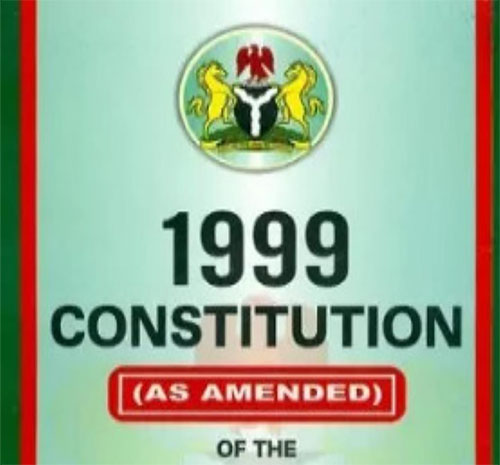The nuisance of Big Govern-ment will not go away very soon because the causes are embedded in the 1999 Nigerian Constitution, with the equal opportunity charter placed smack within the Second Chapter of the Constitution.
Section 14(3) provides: “The composition of the Government of the Federation or any of its agencies and the conduct of its affairs shall be carried out in such a manner as to reflect the federal character of Nigeria and the need to promote national uni-ty, and also to command national loyalty, thereby ensuring that there shall be no predominance of persons from a few States or from a few ethnic or other sectional groups in that Govern-ment or in any of its agencies.”
Section 147 puts a shot in the arm of the President: “(1) There shall be such offices of Ministers of the Government of the Fed-eration as may be established by the President. (2) Any appoint-ment to the office of Minister of the Government of the Fed-eration shall, if the nomination of any person to such office is confirmed by the Senate, be made by the President. (3) Any appointment under subsection (2) of this section by the Presi-dent shall be in conformity with the provisions of section 14(3) of this Constitution:- Provided that in giving effect to the provisions aforesaid the President shall appoint at least one Minister from each State, who shall be an indigene of such State. ”
To the dismay and chagrin of those who do not approve of Big Government, this provision did not provide a cap to the number of ministers that the President can appoint from any of the states, including the Federal Capital Territory.
The United States of America, for instance, with a population of 347 million (2025 estimate), Gross Domestic Product (GDP) of $30.51 trillion and Per Capital Income of $72,479, has a Feder-al Cabinet of 25 members. It is most instructive that the US has just 15 ministries. But Nigeria, with a population of 237 million (2025 estimate), Gross Domes-tic Product (GDP) of $585.9 billion and Per Capital Income of $1,628, has a bloated Federal Cabinet of over 40 members and 29 federal ministries! What is more, the names (and number) of the ministries keep changing!
And, to ensure that no one loses sight of the constitutional provision for federal character, Paragraph 7 of Part I of the Third Schedule of the Constitu-tion provides for a Federal Char-acter Commission with a board comprising one Chairman and one person representing each state of the Federation and the Federal Capital Territory.
Paragraph 8 (1,b,c) provides that “In giving effect to the pro-vision of Section 14(3) and (4) of the Constitution, the Commis-sion shall have the power to – (b) promote, monitor and enforce compliance with the principles of proportional sharing of all bureaucratic, economic, media and political posts at all levels of government; (c) take such legal measures, including the prosecu-tion of the head or staff of any Ministry or government body or agency which fails to comply with any federal character prin-ciple or formula prescribed or adopted by the Commission.”
If the Federal Character Com-mission has been empowered to enforce the provisions of equal opportunities, as enshrined in bold relief in the Constitution, there is no way to avoid a Big Federal Government in a country with 36 states, a Federal Capital Territory, 774 local governments and more than two hundred lin-guistic and cultural tendencies.
We can only imagine the personnel and financial resourc-es that must be invested in the Federal Character Commission itself as it applies itself to the job of monitoring and enforcing the equal opportunity require-ments on the ministries, depart-ments and agencies of the Feder-al Government!
Other federal bodies contrib-uting to Big Government or cost of governance through prolif-eration of administrative offic-es across the federating states include the Code of Conduct Bureau, Independent National Electoral Commission, Nation-al Population Commission and Revenue Mobilisation Allocation and Fiscal Commission.
The financial implication of these constitutional provisions and agencies is in the high personnel emoluments bill of the unwieldy number of govern-ment employees.
Another drain on the economy entrenched in the system via the constitution is in the number of federal lawmakers and the humongous resources they draw from the exchequer. Whereas the US has 100-member Senate, Nigeria has 109 members in the Upper Chamber! Why would the US, the model of our presiden-tial democracy, have a Vice Pres-ident that doubles as the Senate President while Nigeria, a very poor country, has a separate Sen-ate President?
Therefore, there is urgent need to remove from the 1999 Nigeri-an Constitution the provisions that trap ginormous financial resources on Big Governments across the federation, leaving only a pittance for development.
